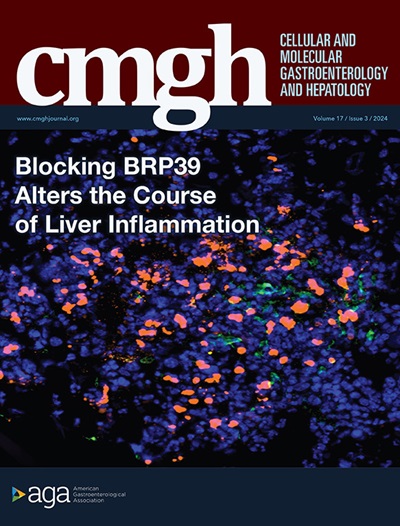Single-cell Profiling of Intrahepatic Immune Cells Reveals an Expansion of Tissue-resident Cytotoxic CD4+ T Lymphocyte Subset Associated With Pathogenesis of Alcoholic-associated Liver Diseases
IF 7.1
1区 医学
Q1 GASTROENTEROLOGY & HEPATOLOGY
Cellular and Molecular Gastroenterology and Hepatology
Pub Date : 2025-01-01
DOI:10.1016/j.jcmgh.2024.101411
引用次数: 0
Abstract
Background & Aims
The immunological mechanisms underpinning the pathogenesis of alcoholic-associated liver disease (ALD) remain incompletely elucidated. This study aims to explore the transcriptomic profiles of hepatic immune cells in ALD compared with healthy individuals and those with metabolic dysfunction-associated steatotic liver disease (MASLD).
Methods
We utilized single-cell RNA sequencing to analyze liver samples from healthy subjects and patients with MASLD and ALD, focusing on the immune cell landscapes within the liver. Key alterations in immune cell subsets were further validated using liver biopsy samples from additional patient cohorts.
Results
We observed a significant accumulation of CD4+ T cells in livers of patients with ALD, surpassing the prevalence of CD8+ T cells, in contrast to patients with MASLD and healthy counterparts, whereas natural killer (NK) cells and γδT cells exhibited reduced intrahepatic infiltration. In-depth transcriptional and developmental trajectory analyses unveiled that a distinct CD4+ subset characterized by granzyme K (GZMK) expression, displaying a tissue-resident signature and terminal effector state, prominently enriched among CD4+ T cells infiltrating the livers of patients with ALD. Subsequent examination of an independent ALD patient cohort corroborated the substantial enrichment of GZMK+CD4+ T lymphocytes, primarily within liver fibrotic zones, suggesting their potential involvement in disease progression. Additionally, we noted shifts in myeloid populations, with expanded APOE+ macrophage and FCGR3B+ monocyte subsets in ALD samples relative to MASLD and healthy tissues.
Conclusions
In summary, this study unravels the intricate cellular diversity within hepatic immune cell populations, highlighting the pivotal immune pathogenic role of the GZMK+CD4+ T lymphocyte subset in ALD pathogenesis.
肝内免疫细胞的单细胞图谱分析表明,组织驻留细胞毒性 CD4+ T 淋巴细胞亚群的扩增与酒精相关肝病的发病机制有关。
背景与目的:酒精相关性肝病(ALD)发病机制的免疫学机制仍未完全阐明。本研究旨在探索与健康人和代谢功能障碍相关性脂肪性肝病(MASLD)患者相比,ALD患者肝脏免疫细胞的转录组特征:我们利用单细胞 RNA 测序技术分析了健康人、MASLD 和 ALD 患者的肝脏样本,重点研究了肝脏内的免疫细胞景观。利用其他患者队列的肝活检样本进一步验证了免疫细胞亚群的关键改变:结果:我们观察到 ALD 患者肝脏中 CD4+ T 细胞明显增多,超过了 CD8+ T 细胞的数量,这与 MASLD 和健康患者形成了鲜明对比,而自然杀伤(NK)细胞和 γδT 细胞的肝内浸润则有所减少。深入的转录和发育轨迹分析揭示了一种以颗粒酶K(GZMK)表达为特征的独特CD4+亚群,该亚群显示出组织驻留特征和终末效应状态,在ALD患者肝脏浸润的CD4+T细胞中明显富集。随后对一个独立的 ALD 患者队列进行的检查证实了 GZMK+CD4+ T 淋巴细胞的大量富集,主要是在肝纤维化区,这表明它们可能参与了疾病的进展。此外,我们还注意到髓系细胞群的变化,ALD样本中的APOE+巨噬细胞和FCGR3B+单核细胞亚群相对于MASLD和健康组织有所扩大:总之,本研究揭示了肝脏免疫细胞群中错综复杂的细胞多样性,突出了GZMK+CD4+ T淋巴细胞亚群在ALD发病机制中的关键免疫致病作用。
本文章由计算机程序翻译,如有差异,请以英文原文为准。
求助全文
约1分钟内获得全文
求助全文
来源期刊

Cellular and Molecular Gastroenterology and Hepatology
Medicine-Gastroenterology
CiteScore
13.00
自引率
2.80%
发文量
246
审稿时长
42 days
期刊介绍:
"Cell and Molecular Gastroenterology and Hepatology (CMGH)" is a journal dedicated to advancing the understanding of digestive biology through impactful research that spans the spectrum of normal gastrointestinal, hepatic, and pancreatic functions, as well as their pathologies. The journal's mission is to publish high-quality, hypothesis-driven studies that offer mechanistic novelty and are methodologically robust, covering a wide range of themes in gastroenterology, hepatology, and pancreatology.
CMGH reports on the latest scientific advances in cell biology, immunology, physiology, microbiology, genetics, and neurobiology related to gastrointestinal, hepatobiliary, and pancreatic health and disease. The research published in CMGH is designed to address significant questions in the field, utilizing a variety of experimental approaches, including in vitro models, patient-derived tissues or cells, and animal models. This multifaceted approach enables the journal to contribute to both fundamental discoveries and their translation into clinical applications, ultimately aiming to improve patient care and treatment outcomes in digestive health.
 求助内容:
求助内容: 应助结果提醒方式:
应助结果提醒方式:


